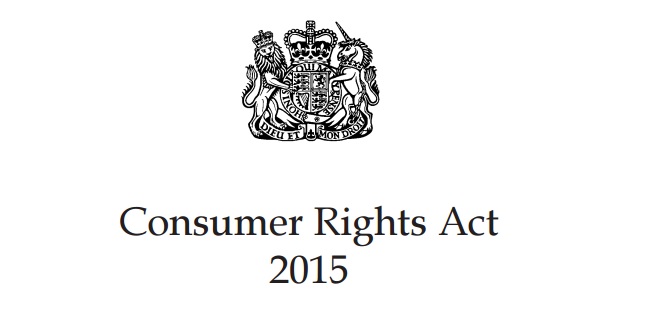From October 1st 2015, consumer law is changing, with the Consumer Rights Act 2015 changing many of the rules and regulations about providing goods and services online. It’s estimated to boost the UK economy by £4 billion over the next decade.
This move has been described by the government as the “biggest overhaul of consumer rights in a generation”, making the existing rules a lot clearer and much easier to understand. Essentially, it brings important updates to existing laws, and clarifies many parts which can be unclear.
The Consumer Rights Act 2015 Aims to streamline complicated law from 8 pieces of legislation into one single place, replacing the Sale of Goods Act 1979 and the Supply of Goods and Services Act 1982.
This will ensure consumers have confidence in ecommerce stores online, and that these businesses can also sell to customers with confidence. It’s also the first time that digital content has rights set out in legislation.

Vince Cable said:
“Consumers will now be much better informed and protected when buying goods or services on the internet. They will now be entitled to get for the first time a free repair or replacement for any faulty digital content.”
What does it mean?
Consumers will have new rights after the 1st of October. Digital products and content has evolved, and so must the legislation that governs it.
It aims to avoid disputes between sellers and consumers, and ensure both have the confidence to buy and sell online.
These rights includes:
- A 30-day time period in which to return faulty goods, and replacement rights for digital content which is deemed faulty.
- What happens when there is a breach of a contract to supply goods, services, or digital content
- Provisions for unfair terms
- What to do when goods are faulty
- What to do when digital content is faulty
- How goods or services should match to what was agreed, and the consequences otherwise
For products
Customers have the right to reject any defective goods for up to 30 days after they have received the goods, and claim a full refund.
After 30 days, they are allowed to claim a replacement or repair. If this isn’t available or applicable, or the repair is unsuccessful or is not performed within a reasonable amount of time, they can request a price reduction, or still reject the goods.
An example from the government website:
You buy a £20 toaster but after 3 and a half weeks you find that it no longer works. Currently under the law it is not clear whether you have a right to return the goods and get a refund because it is not clear if 3 and a half weeks is ‘reasonable time’. Under the Act you will have a clear right to a full refund as fewer than 30 days have passed.
For digital content
This act regulates the supply of digital content for the first time. Any data produced and supplied in any digital format is affected by these new rules, whether you have charged for it or supplied it for free.
This includes products such as applications, software, videos, games, e-books, music, or films.
The Consumer Rights Act 2015 states that the sale of digital content must follow these rules:
- Businesses can have more than one attempt at repairing digital content after 30 days
- There is no right of rejection for digital content, as there is no way to return digital content and there’s no requirement for a consumer to delete content from their device; unless the digital content comes alongside physical goods
- If the digital content in question damages the device or hardware it is loaded upon, compensation may have to be paid, even if the content is free of charge
An example of digital content:
You buy a DVD but when played it jumps erratically or gets stuck. You try to return it but the retailer says that they do not offer refunds on DVDs. Under current legislation your rights are unclear, but the Bill makes it clear that for faulty digital content bought on a tangible medium such as a DVD, you are entitled to a refund within 30 days of purchase.
Services
The new rules detail that if you haven’t clearly expressed and agreed the prices for the services in question, you may only charge what is deemed a reasonable price.
If these services are not up to standard, the consumer can make you repeat the service, or claim a price reduction. Otherwise, customers may be able to claim compensation for any losses which are incurred.
An example:
You contract a photographer to cover your wedding and capture shots throughout the day starting with the church ceremony which starts at 1pm. You pay £2,000 for the service. There is a clause in the contract which says that the maximum discount for any problems caused by the photographer is £1,000.
The photographer arrives late at 4pm and misses the ceremony. This means that they have breached the contract by not arriving at 1pm. The term limiting the price reduction is invalid. The photography service cannot be repeated, as the wedding has already happened. Under the Act you are entitled to a reduction in price (possibly up to 100 per cent) due to non-compliance with the information provided.
Am I affected?
These new regulations cover businesses which are selling products, services, or digital content online to consumers.
However, it does not cover B2B transactions, as this is specifically focused on consumers. However, if a customer purchases a product that may be mixed business or personal purposes, then they could be counted as a consumer under these new rules.
Additionally, Alternative Dispute Resolution is available to all businesses when a dispute with a consumer cannot be settled directly.
What do I need to do?
Once you’re fully clued up on how the Consumer Rights Act 2015 affects your specific products or services, then it’s time to make some changes.
You should update your website, or marketing material with the new information, and update your sales team on what the new regulations means for their correspondence with consumers.
If you have written material or conversations with your team, you will be bound by what is said or written, without taking your terms & conditions into account. Any written or spoken material must include the quotes, timescales, or the results to be achieved.
For more information on what the Consumer Rights Act 2015 changes, you can read the full Consumer Rights Act 2015 here.













